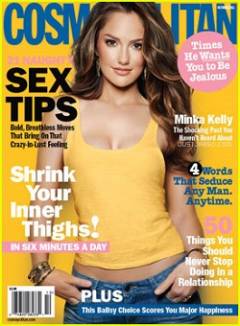When asked about his involvement with super-sexy-super-witty-super-model-super-singer Carla Bruni, President Sarkozy responded: “It’s serious”, according to a CNN sound byte during NH primary coverage.
However, a little YouTube digging revealed his ACTUAL answer: a five-minute response that ranged widely through the historical precedents for asking a president such a question, the difficulties of human relationships in general, and the ludicrousness of the media caring so much about the personal life of a man who is fundamentally like any other… which goes hand-in-hand with the contemporary media misconception that being covert about one’s private life somehow corresponds to corrupt and nontransparent leadership (COUGH Bill Clinton).
I wish the current U.S. Presidential candidates could give this kind of response to media badgering. It was bitingly sarcastic, well-informed, and evinced a level of sophisticated contemplation beyond mere pre-press-conference maneuvering (“Being the President of the Republic doesn’t guarantee one the right to happiness–no more happiness than anyone else has. But no less, either”), and it certainly wasn’t cut into slogans meant for endless replay in news commercials. He reminisced about the days when “A chacun sa vie” (“to each his own”) was the reigning philosophy when it came to personal presidential matters, and it made me miss those days, too.
Ironically, carrying on about this for so long–even though he was criticizing the nature of the question–actually lowered his approval ratings, since citizens complained he was spending too much time talking about his relationship and not about real politics… imagine THAT public response in OUR country…
Sarkozy’s tone and perspective remind me of Hillary’s sarcastic response to the fact that people don’t find her “likable”: “That hurts my feelings! …but… I guess I’ll just have to carry on, somehow…” And, to reference the over-played Hillary-tears-up tape, her message that behind the rehearsed responses to debate questions, beyond the stark polling numbers, she is deeply and personally invested in making our country a better place and in pointing it away from what she sees as a darkening future is… refreshing (and sounds a little like that guy who just won the peace prize). As much as I don’t like Sarkozy, and though I am reluctant to vote for Hilary, that kind of meta-level perspective is what we’ve been sorely missing in the presidency lately; without it America has gotten into serious trouble.
These little glimpses of politicos’ evolution States-side and abroad give me at least a little hope. But if I have to go through a whole election year watching CNN cut rich, challenging rhetoric down to “It’s serious,” and furthermore have to watch candidates cater to that simple-minded standard, I’ll have trouble believing my vote is in any way ‘informed,’ or that our election process is anything more than a tabloid-triggered shot in the dark.
[This cutting diagnosis of media’s preference for sound bites over reasoned responses — and for sexual gossip rather than political intelligence — comes from Julie Johnson, editor of Clarion at Boston University. When she told me how CNN had chopped President Sarkozy’s responses, I shook my head first not at the infantilitzation of our public discourse, but rather at the sad fact that media outlets find it profitable to fix their cameras on the face and body of politicians’ partners like Carla Bruni or Camilla Parker Bowles. How offensive that mascara should play any role in a campaign plan; that it can and does speaks to the pervasive view of female companions as possessions owned by men in power. Are the male companions of female candidates subjected to this scrutiny? I don’t believe they are, since that deep-rooted tradition of political dimorphism lodged in our media psyche favors men, demeans women, and altogether ignores those outside the heteronormative groove. –CivilizeMe ]





 t explanation: a conspiracy between superficial media culture (whose distortions of the healthy female form pollute even the youngest minds) and unscrupulous plastic surgeons(ever ready to ignore the Hippocratic oath in favor of that more fitting Greek icon, Pluto, captain of wealth and death). Whatever reasons led her to first consider chest enhancement, her motivations since have been corrupted, co-opted, by a self-image disorder. However, instead of working through the moral and medical background of Hershey’s situation, let’s instead look at the responses to her situation left by Internet users at two different but predictably similiar articles: one from
t explanation: a conspiracy between superficial media culture (whose distortions of the healthy female form pollute even the youngest minds) and unscrupulous plastic surgeons(ever ready to ignore the Hippocratic oath in favor of that more fitting Greek icon, Pluto, captain of wealth and death). Whatever reasons led her to first consider chest enhancement, her motivations since have been corrupted, co-opted, by a self-image disorder. However, instead of working through the moral and medical background of Hershey’s situation, let’s instead look at the responses to her situation left by Internet users at two different but predictably similiar articles: one from